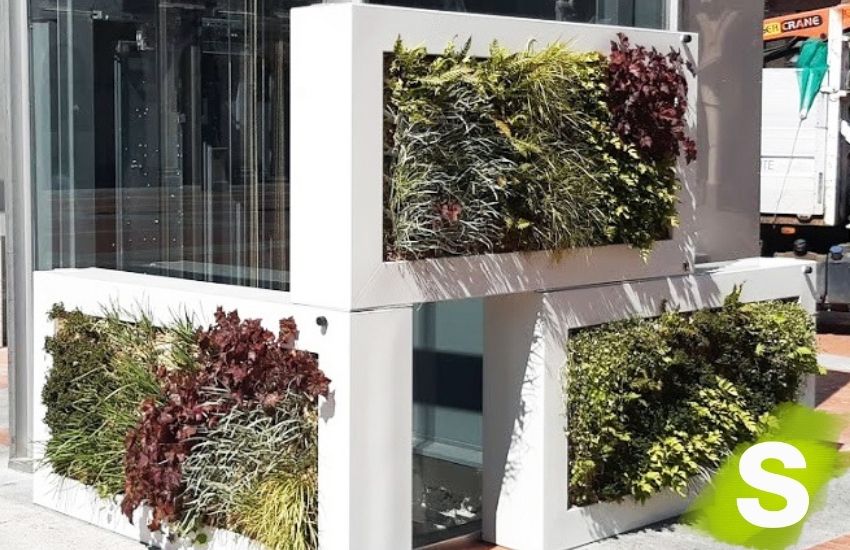Since we began our journey back in 2016 with the European project URBAN GreenUP in Valladolid, we have designed various nature-based solutions in coordination with the CARTIF technological center for the re-naturalization of this city.
What is the European Project in Valladolid called URBAN GreenUP?
Before we begin to explain our proposals within this project, it is essential to refresh our memory and define what this project entails.
It is a program funded by the European Union’s Horizon 2020 instrument, aimed at developing, implementing, and validating a methodology for re-naturalizing urban plans to mitigate the effects of climate change, improve air quality, manage water resources, and enhance the sustainability of our cities through innovative nature-based solutions.
Participants
This project involves eight partner cities. The cities are divided into two groups: the first group consists of three European cities—Valladolid, Izmir, and Liverpool. The second group, known as the followers, includes three European cities and two non-European cities: Chengdu, Ludwigsburg, Montova, Medellín, and Quy Nhon.
In this case, we want to focus on the nature-based solutions proposed in this project called URBAN GreenUP in Valladolid.
Our Proposal for Nature-Based Solutions for this Project
Vegetative Roofs on the Canopies of Plaza España
Location
The vegetative roofs designed for the European project in Valladolid are located in Plaza de España. In this plaza, there are two canopies, and underneath them, there is a daily fruit market.
Environmental Conditions
To carry out this work, a water supply was needed. In that plaza, several fountains had been installed, so the water would be sourced from the connections of those fountains.
Project Description
This roof covers an area of 488 m² divided into four sections. It was designed to be as lightweight as possible, so a very fine and light substrate was used to avoid imposing a heavy load on the roof.
Benefits
The goals of this project are as follows:
- Decrease daytime temperatures and mitigate the “heatwave” effect.
- Improve the quality of life for elderly residents.
- Reduce pollution levels.
This project has already been completed, and here is a short video showing its condition a few weeks ago during the construction process.
Vegetative Canopies on Santa María Street
Location
These canopies designed for the European project in Valladolid were installed on the central and commercial street of Santa María.

Descripción de proyecto
The canopies are composed of textile panels tensioned by a steel cable. An inert substrate is added to the textile panel where vegetation grows. Additionally, they are equipped with a drip irrigation system. These canopies are designed to be installed on the street and can be anchored to building facades or sidewalk posts. Their purpose is to provide shade in areas that are constantly exposed to sunlight.
Below, we provide a YouTube video about this great nature-based solution. If you’re interested, you can find a series of four videos on YouTube that explain this project in total depth.
Benefits of Their Construction
- Decrease daytime temperatures and mitigate the “heatwave” effect.
- Improve the quality of life for residents.
- Reduce pollution levels.Maintain
- lower temperatures due to the shade they provide in streets with higher sun exposure.
Living walls at El Corte Inglés in Valladolid
Location
El Corte Inglés is a private commercial building located in the center of Valladolid. We selected this building because it is a highly frequented shopping center, and we wanted to create a significant impact on the community. Additionally, we aimed for a company of such magnitude to get involved with this European project in Valladolid.

Condiciones de entorno
El jardín vertical se iba a realizar en la fachada ya existente del propio centro comercial por lo tanto su diseño debía seguir la geometría hexagonal marcada por la pared.
Descripción del proyecto
Una pared verde es un sistema constructivo cuya finalidad es plantar especies vegetales en la superficie vertical de la fachada. Este jardín vertical cuenta con unas dimensiones de 351,05 m2, divididos en dos fachadas. La fachada norte, en la calle Constitución, tiene un área de 271,80 m2, y la fachada este, en la calle Menendez Pelayo, tendrá 79,25 m2.
Composition of the System
The vertical gardens consist of the following elements:
- Irrigation System: Drip tubing that saturates the substrate.
- Metal Structure: This structure is fixed to the facade and consists of metal posts placed every 64 cm.
- Waterproof Layer: Panels made of foamed PVC.
- Hydroponic Substrate: Panels made of rock wool specially designed for plant growth.
- Vegetation: Plants that are resilient to the local conditions.
- Water Collection System: Excess water is collected at the bottom of the vertical garden and recirculated.
Benefits of Its Construction
- Reduce the temperature during the day and the “urban heat island” effect.
- Decrease levels of pollution.
Vegetal Letters
Location
Located in Plaza Portugalete, near the cathedral.

Project Description
In this case, the vertical garden is composed of a galvanized steel structure, wooden sleepers, and stainless steel sheet forming the three-dimensional text of the word “Valladolid.” On top of the structure, there is a vertical garden system F+P, which consists of a 10mm thick foam PVC panel, a 100mm thick substrate on which a grass sod is placed, an irrigation system, and a steel water collection channel.
Benefits
- Increase tourist appeal.
- Reduce pollution levels.
- Lower daytime temperatures, decreasing the “heat island” effect.
Urban bio filters

Location
This nature-based solution is located in two areas: one in Zorilla Square and the other in San Andrés Square. These areas meet all the requirements as they feature large spaces lacking greenery, are situated in the city center, are well-connected, and are accessible to citizens.
Environmental Conditions
This solution is ideal for urban areas that lack means to provide shade. The perfect location for these vertical gardens should be in places with a shortage of green spaces and good accessibility for residents.
Project Description
Each hydroponic vertical garden measures 5.25m in length and 2.35m in height. The area occupied by the plants is 3.80m long with a total area of 6.95m² on each side. On one side, an area has been designed for citizens to sit while enjoying the refreshing cool air from the garden, thanks to the incorporation of solar fans.
Benefits
The goals of this initiative are to:
- Decrease the temperature during the day and mitigate the effects of “heat waves.”
- Reduce levels of environmental pollution.
- Reactivate public spaces and transform them into recreational areas.
- Recover green spaces and increase biodiversity.
Mobile Frames
Environmental Conditions
This idea is ideal for open urban spaces that lack shade elements. The areas should be accessible to citizens, located in places with a shortage of green spaces and/or responding to the demands of the citizens, ensuring their access to these areas. The properties of the system with Sphagnum allow for a wide range of possible locations within the urban core of Valladolid, as well as a great diversity of solutions depending on the location.

Project Description
The Sphagnum plant frames consist of two stacked modules, each measuring 2 meters long, 1 meter high, and 0.3 meters thick, featuring a vertical garden on only one of their two sides. The area occupied by the vegetation totals 2.40 square meters when combining both panels.
Beneficits
This nature-based solution is designed to complement other non-technical interventions, such as workshops aimed at citizens, to practically explain how planting can be done in this system, allowing them to participate in the process for a specific frame. Therefore, we believe it is a great idea to educate, inform, and raise awareness among citizens about the essential role of vegetation in our cities.
Sound Barriers
This project is currently being developed with the aim of reducing traffic noise that reaches homes along the street. On one hand, the green sound barriers have a specific geometry that promotes sound reflection; on the other hand, they include modules of vertical gardens with a specific substrate that enhances sound absorption.
Here, we present a simulation of the initial idea we started from:
Some of these projects are already constructed, while others are in progress, and we hope to show them to you soon. We are thrilled to be part of these projects and to carry out this initiative because we are highly motivated to work for the well-being of our cities.







